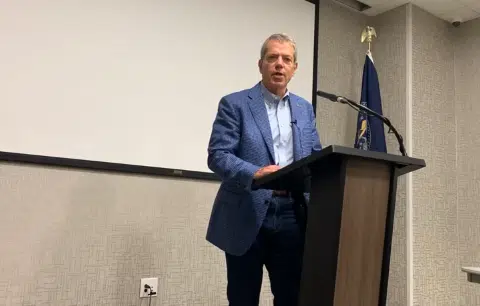
Nebraska Governor Jim Pillen
On his monthly statewide call in show Monday — hosted on 1400 & 99.3 KLIN — Governor Jim Pillen proposed the state may completely take on funding for K-12 public schools in order to deliver tax relief to Nebraska property owners.
“It’s never been an intent that property taxes educate our kids,” Pillen said to host Mark Vail. “So our plan is that the state funds K-12 education. Everybody’s property taxes, depending on the county it’ll vary, but most people’s homes, 60% of their of their property tax is for K-12 education. The state funds K-12 education, that property tax goes to zero.”
Pillen also pitched this as a solution that would simplify the funding system for Nebraska schools.
“The TEEOSA formula is so complicated, so complicated in the last 34 years, that most 9/10 superintendents don’t understand it,” Pillen said. “Most of our school board members are not, do not have financial backgrounds.”
In 1990, Nebraska State Senators Scott Moore of Stromsburg and Ron Withem of Papillion introduced LB 1059, creating the Tax Equity and Educational Opportunities Support Act, often referred to as the “TEEOSA formula.” TEEOSA was introduced to provide property tax relief at a time when Nebraska ranked as the 10th highest state in the nation for property taxes, with 70% of those taxes funding state schooling. Now, as Nebraska ranks as the 7th highest state for property tax, Pillen is considering eliminating TEEOSA to achieve the same goal of property tax relief. The solution of the past is now on the chopping block, deemed part of the problem.
While admittedly complicated by those who crafted the legislation, TEESOA created a system that aimed to equitably provide educational opportunities to students and funding for school districts, as well as tax equity for both taxpayers and schools. The simplified formula:
Needs – Resources = Aid
In exchange for a decrease in property tax reductions, TEEOSA bumped Nebraska’s primary income tax rate to 3.7% and the state sales-and-use tax rate from 4% to 5%. Moore described TEEOSA as “probably the biggest piece of legislation we passed in this Legislature in the last twenty years and probably the next twenty years after that.”
This solution from Pillen mirrors legislation passed in 2023 that obligated the state to pick up tab for community colleges, and is the first prong of a two-prong approach, calling for “hard caps” on school spending.
“We have a state statute, crystal clear. If a valuation goes up 20%, the levy is supposed to decrease accordingly. And it does. That’s state statute. However, every [school] board has the authority to override it, and every [school] board overrides it 100% of the time. That’s exactly why our plan is so different than what anybody’s ever talked about in the last 60 years, is we have to say ‘no,’ we have to have hard caps, stop spending,” Pillen said.
As for where the state would get the additional funds to take over K-12 education, Pillen — again drawing a comparison to the TEEOSA formula — proposed a “broad based sales tax.”
“One thing all economists agree on… if you want to stagnate your economy, have high property tax, they all agree. And sales tax has the least impact,” said Pillen. “We pay for it by a broad based sales tax that will mimic what our neighboring states are doing.”
In 2023, Nebraskans paid $5.3 billion in property tax, $3.7 in income tax, $2.3 in sales tax, “It’s supposed to be the exact opposite,” Pillen stated.
Pillen issued a “save-the-date” announcement earlier this month to state senators for a property-tax reform special session between July 26 through August 15. He said he signed a letter to be delivered to lawmakers just prior to visiting the KLIN studio for the call-in show, and has a plan, but has not been able to “put it down” officially yet.
“I have lots of work to do to interact with the members of the unicameral. I’ve made a commitment for a trade mission to Indonesia, July for 12-days. And I want to make sure I have time when I get back to make sure we’re ready to roll,” Pillen concluded.






